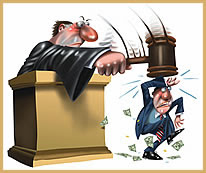We post news and comment on federal criminal justice issues, focused primarily on trial and post-conviction matters, legislative initiatives, and sentencing issues.

AT LEAST THEY’RE TALKING ABOUT IT…
 Hearings on the nomination of Judge Brett Kavanaugh to serve on the Supreme Court opened this past Tuesday and are to conclude tomorrow, and debate (at least among scholars, rather than the rabble in the hearing room) has already ramped up on the Judge’s dislike of the acquitted conduct rules in the Sentencing Guidelines.
Hearings on the nomination of Judge Brett Kavanaugh to serve on the Supreme Court opened this past Tuesday and are to conclude tomorrow, and debate (at least among scholars, rather than the rabble in the hearing room) has already ramped up on the Judge’s dislike of the acquitted conduct rules in the Sentencing Guidelines.
Under the Guidelines, a defendant convicted on one count but acquitted on other counts can be sentenced as if he or she was guilty on everything, as long as the court finds it more likely than not that the defendant did what the jury acquitted him or her on.
Kavanaugh, a generally conservative judge, wrote separately in a 2015 appeal decision to ask, if a defendant has a right to “have a jury find beyond a reasonable doubt the facts that make him guilty and received, for example, a five-year sentence, why doesn’t he have a right to have a jury find beyond a reasonable doubt the facts that increase that five-year sentence to, say, a 20-year sentence?”
Or, as Blakely v. Washington put it, “[A]s the law now stands, prosecutors can brush off the jury’s judgment by persuading judges to use the very same facts the jury rejected at trial to multiply the duration of a defendant’s loss of liberty threefold. In that regime, the jury is largely “relegated to making a determination that the defendant at some point did something wrong, a mere preliminary to a judicial inquisition into the facts of the crime the State actually seeks to punish” at sentencing.”
 Writing at SCOTUSBlog last week, Sen. Orrin Hatch (R-Utah), senior senator on the Judiciary Committee, said, “In the past, I have been supportive of considering all relevant conduct at sentencing, including acquitted conduct. But Kavanaugh and others have convinced me that this practice must end — as a matter of fundamental fairness if not of constitutional law. I plan to soon introduce the Acquitted Conduct Sentencing Reform Act, which will stop judges from punishing defendants for crimes for which a jury found them “not guilty.” The contours of civilization require fairness in our criminal justice system, and the Constitution demands that American men and women hold prosecutors and judges accountable. The role of the jury is central to the Constitution’s protection of individual rights, and it is time for Congress to restore power to the people.”
Writing at SCOTUSBlog last week, Sen. Orrin Hatch (R-Utah), senior senator on the Judiciary Committee, said, “In the past, I have been supportive of considering all relevant conduct at sentencing, including acquitted conduct. But Kavanaugh and others have convinced me that this practice must end — as a matter of fundamental fairness if not of constitutional law. I plan to soon introduce the Acquitted Conduct Sentencing Reform Act, which will stop judges from punishing defendants for crimes for which a jury found them “not guilty.” The contours of civilization require fairness in our criminal justice system, and the Constitution demands that American men and women hold prosecutors and judges accountable. The role of the jury is central to the Constitution’s protection of individual rights, and it is time for Congress to restore power to the people.”
SCOTUSBlog.com, Judge Kavanaugh’s fight for stronger jury rights (Aug. 31, 2018)
– Thomas L. Root

